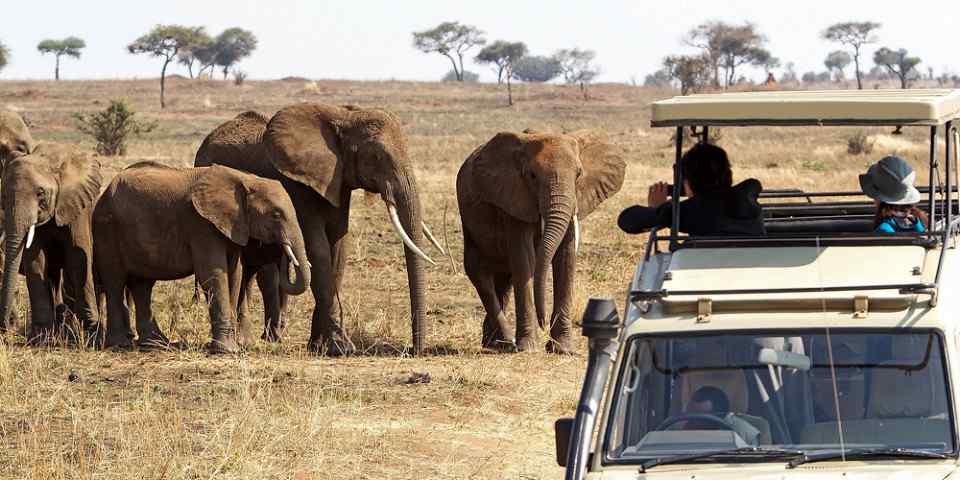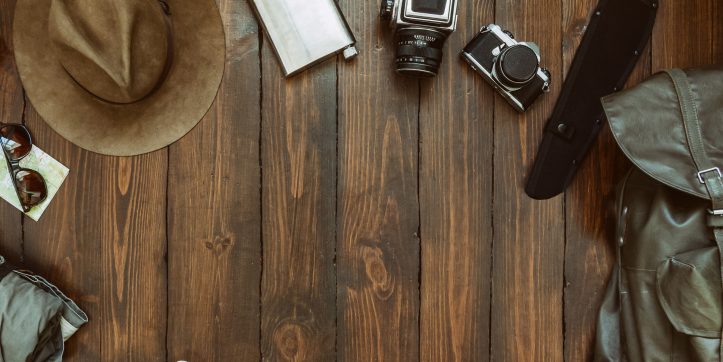
10 Things You Must Pack for Your Safari
 By Patrick Brakspear
By Patrick Brakspear Patrick has been an Africa travel specialist, based in Australia, for over 10 years and prior to that was a safari operator in Mana Pools in Zimbabwe.
You’ve waited months for your safari to finally come around. And now you have to decide what you must pack for your safari. Decisions, decisions, decisions. SafariBookings is here to help. Below are a few of our tips.
1. Passport, Itinerary, Travel Insurance Info and E-tickets
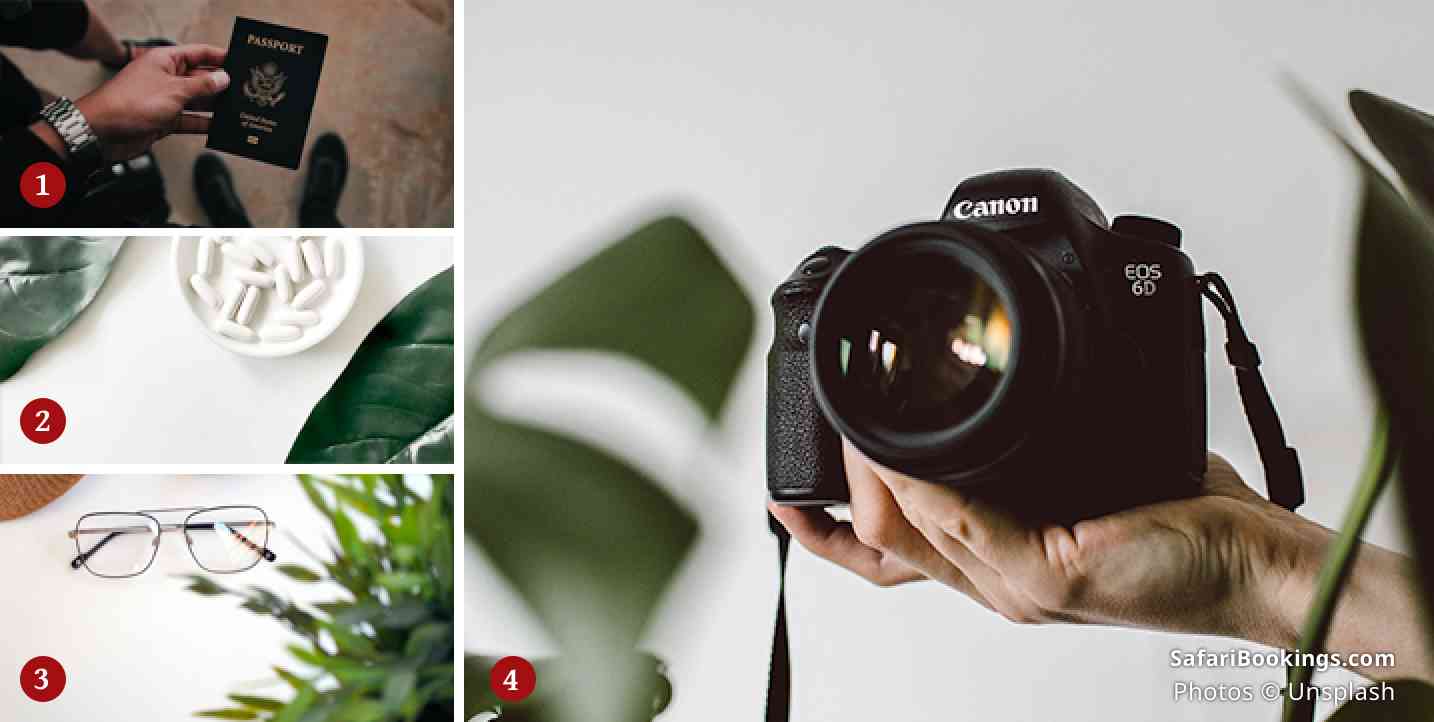
It seems obvious, but we would be remiss if we didn’t put these at the top of the list of what you must pack for your safari.
2. Prescription Medications
Remember to put your prescription medications in your hand luggage (in case your check-in bag goes astray ... it happens) and make sure you have enough of each type to last your entire safari. Get advice from your doctor before traveling about whether you’ll need any antimalarial tablets for your destination(s).
3. Prescription Glasses, Sunglasses, Hat and Other Sun Protection
If you wear prescription glasses, be sure to pack more than one pair (in case you lose one or they get broken). You will be outdoors for much of the time, so be prepared. Pack a hat, sunglasses, sunscreen, long sleeves and lip balm.
4. Camera, Video and Binoculars
While most people will remember to take their camera and/or video (or will use their mobile phone), not everyone thinks they need to take binoculars.
Binoculars are essential for optimum wildlife viewing and a good pair will make a big difference to your safari. Get the most expensive you can afford (at least 8x, or better still 10x magnification).
Africa is a photographer’s dream. Not only does the boundless wildlife come in all shapes and sizes, but the continent is also blessed with stunning landscapes, wonderful people and fabulous light. Don’t miss out. Buy a camera if you don’t already have one.
5. Clothes and Toiletries
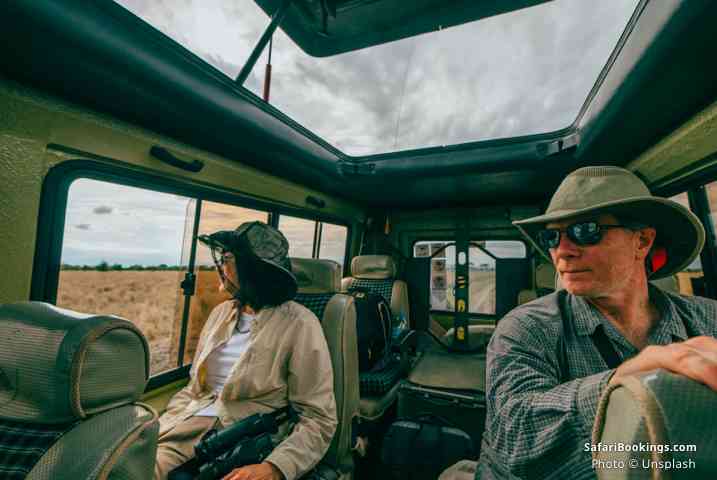
Of course you’re not going to forget clothes! But are you taking the right clothes and are you within those weight restrictions your tour operator told you about for those light aircraft flights?
Most international airlines will restrict your check-in luggage to around 20kg to 30kg (44lb to 55lb). However, if your safari itinerary includes any light aircraft flights, then this can mean as little as 12kg to 15kg (26lb to 33lb), sometimes including your hand luggage.
Remember, a same-day laundry service is usually available in most safari camps and lodges. This means you do not need a change of clothes for each day you are on safari. The exception will be for mobile tented safaris where it is often difficult, due the mobile nature, to offer a laundry service. It may also be possible to leave a bag with the charter company, or person meeting you, for the duration of the safari portion. When in doubt, ask your tour operator.
Casual but Comfortable
Casual, comfortable clothing is suitable throughout the year when on safari. While you may choose to start a completely new safari wardrobe, it is really not necessary to look like an extra from the set of the film ‘Out of Africa’. Apart from selecting reasonably neutral or muted clothing, safari wear is generally casual and practical. Be sure you take clothes that you feel comfortable in – especially when it comes to your walking/hiking boots. Quick-drying fabrics, shirts with ventilation and trousers that convert into shorts are all worth considering.
Layering Is Key
Wearing clothes in layers is the most practical way to cope with fluctuating day/night temperatures and cool evenings while on safari. As the day warms up you can peel off a layer. Then as it begins to cool toward evening, you can put them back on. To avoid being bitten by mosquitoes in the evenings, cover up by wearing trousers and long sleeves.
Here are the must-haves to pack for your safari:
A) T-shirt, shirt or blouse – long sleeves and collars help to protect from the sun and mosquitoes
B) Fleece or warm jacket
C) Pair of safari trousers – those that zip off at the knees are very handy
D) Comfortable walking shoes or boots and socks
E) Hat
F) Bandanna or cotton scarf and a sarong
G) Pair of open sports sandals for general daytime use in warmer months
H) Swimsuit – a number of lodges and camps have swimming pools
I) Elegantly casual outfit for dinner at the smarter hotels
J) Light, compact raincoat if it is likely you will encounter rain
K) And, of course, your undergarments
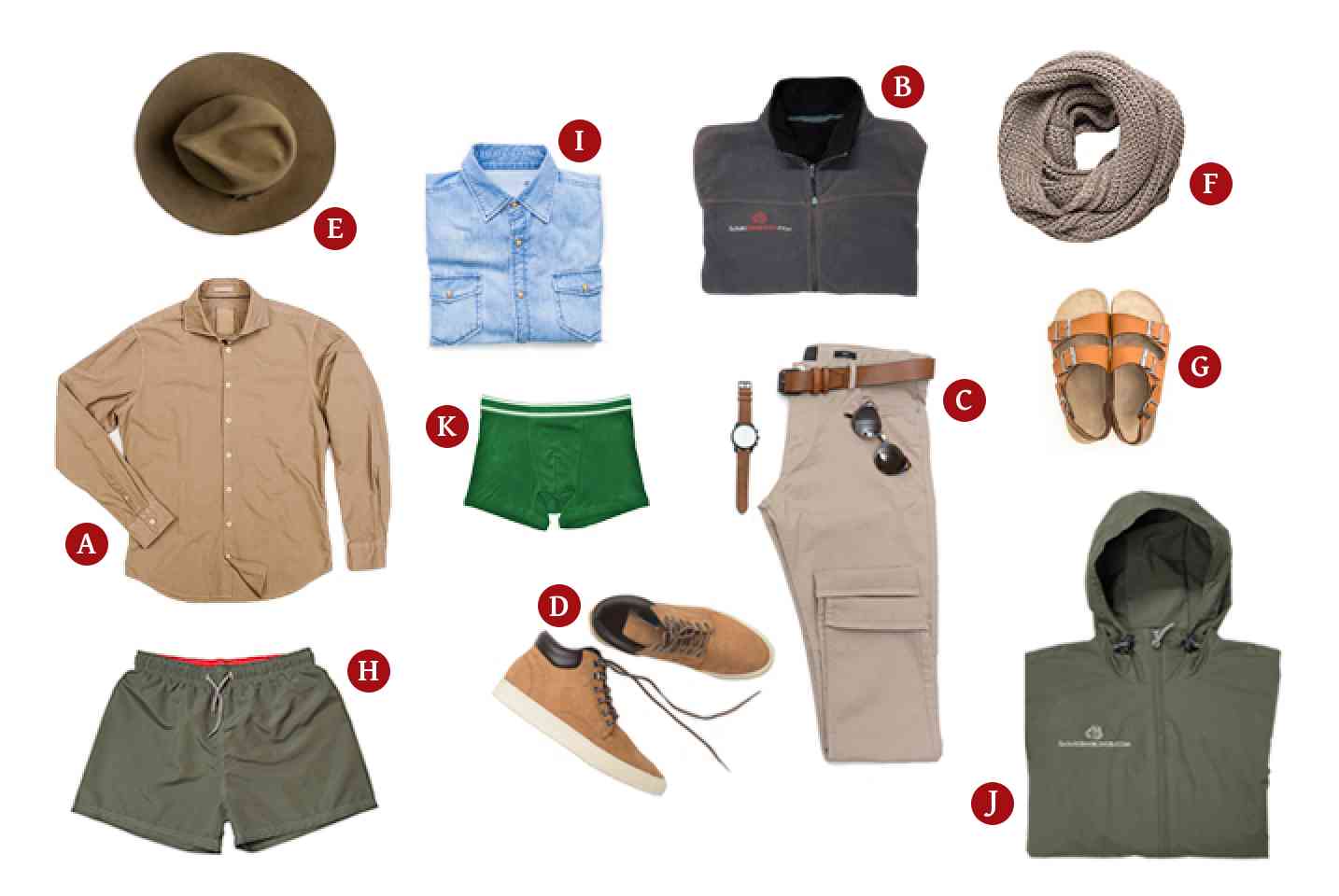
Muted and/or neutral colors are more suitable for safari, as white and/or bright colours are not practical as they tend to stand out and are definitely not advisable on a walking safari. Cotton clothing is recommended although synthetic safari clothing is quick drying and extremely comfortable.
Check the Weather
Find out what the weather will be like where you are going. You may not need any serious cold weather gear at all (and that will really help with the luggage limit). Alternatively, if you are going anywhere in winter where the temperature drops dramatically when the sun goes down, you may need gloves, a scarf, a thick jacket and a beanie. Places such as Hwange National Park, the Okavango Delta, Linyanti Concession and even Kruger National Park are freezing in the early morning and late evening during the winter months of June through to August. And this is magnified by a significant wind-chill factor that you'll feel when on the back of an open game-drive vehicle.
6. Phone, Music, Tablet or Laptop
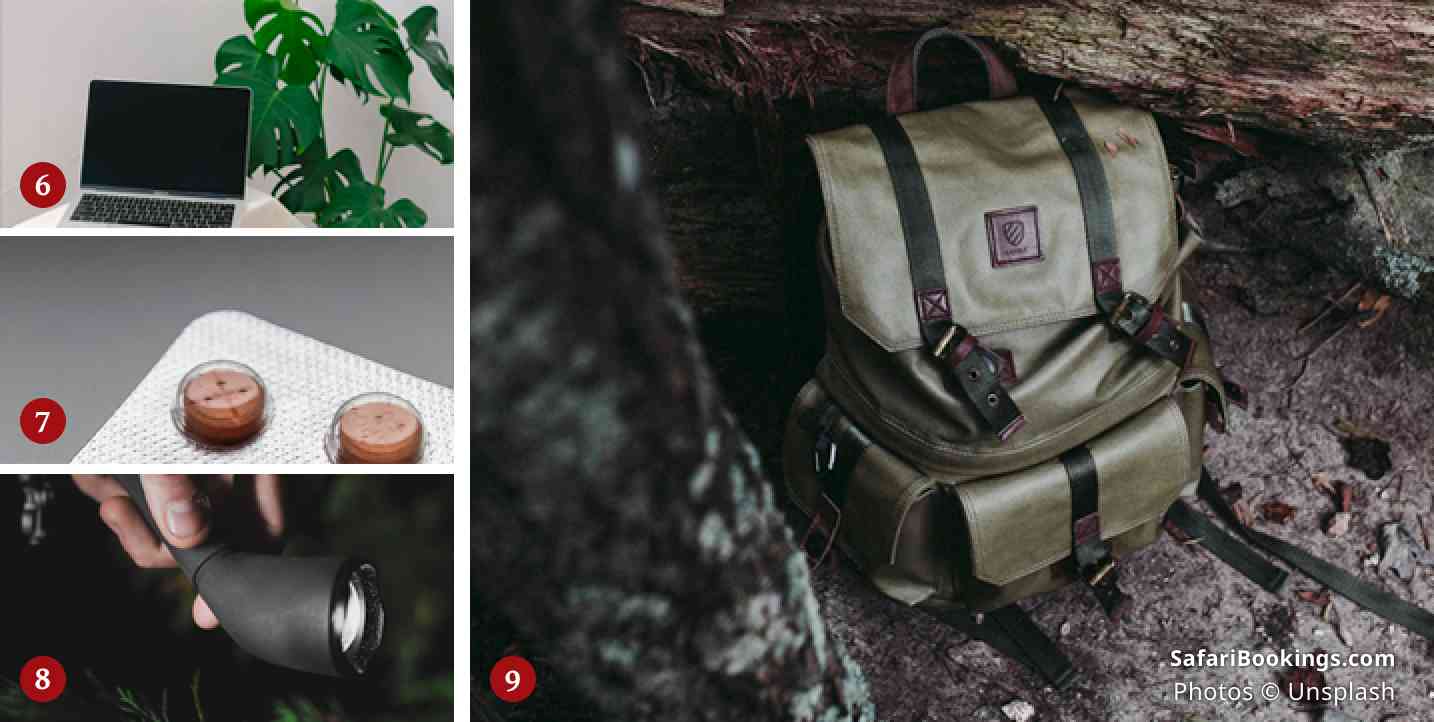
If you are bringing your phone, music, tablet or laptop, don’t forget their respective chargers and country-specific adaptor plugs.
7. Preventative Pharmaceuticals
It’s a good idea to carry any medications you may need in case the worst happens: diarrhea, headaches, heartburn, indigestion, insect bites, allergies, cold, flu, sore throat, or sore eyes being some of the more common ailments. Also carry some insect repellent (with at least 30% DEET) to keep away the mosquitoes.
8. Odds and Ends
A good torch (flashlight) is a must. It can be pitch black in the bush or in your tent in the middle of the night. A rechargeable torch is ideal but a small battery-powered torch is sufficient. A headlamp that sits on your head (and leaves your hands free) is also a good option. A smaller (pencil) torch for emergencies or looking at star maps is also worth considering. Most camps will provide a torch, or will walk you back to your tent as required, but being self-sufficient is always a good idea.
It never hurts to have an interesting book when traveling. You never know when you are going to be delayed at the airport or fall victim to Africa time! A travel diary or journal is also something we recommend. You will see and experience so much in such a short period of time on safari, and writing everything down will help you maintain a good record of it. It does require discipline, but will serve as an invaluable record of your safari adventure.
9. Hand Luggage
Firstly, try to restrict your hand luggage to one item only, if for no other reason than more than one item makes travel that much harder. And, yes, a handbag qualifies as a second item. Obviously, that one item should be of a size that is acceptable as carry-on luggage by the airlines. If you are a photographer, then this will mean you must have sufficient space in your camera bag for travel documents, your prescription medication and/or glasses, binoculars and even a change of clothes.
Bear in mind that there are restrictions on what can and cannot be taken on board an aircraft. The rules change frequently, so please double-check before you travel.
10. Some Final Tips
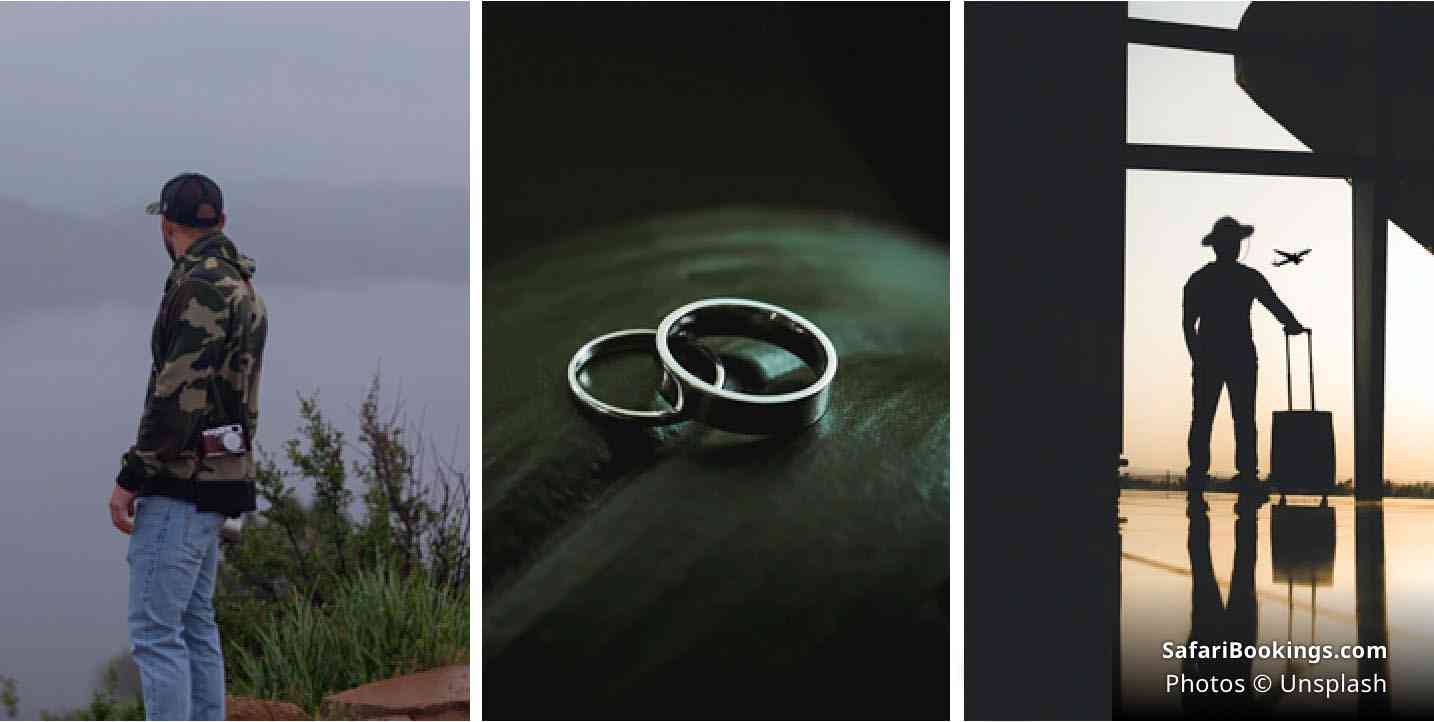
It is not advisable to wear any form of clothing that may be interpreted as camouflage. This could be any form of brown/green combat-style coloring even if it is just a cap. Many African authorities have a disproportionate phobia about such garments and this could conceivably result in you being questioned or harassed by the police. It has the potential to cause you grief, so best avoided.
Do not take any expensive personal jewelry on safari. Be minimalist or take only those everyday items that you normally wear, such as your wedding band or inexpensive earrings.
With regard to securing your luggage, we suggest using one or more combination locks to secure zips together if your suitcase does not have its own locking mechanism. Luggage tampering in airports does occur, unfortunately. Luggage straps that wrap around your suitcase can also deter, while shrink-wrapping facilities are available at some airports.
Want To Go on an African Safari?
Click on the button below to compare African safaris offered by top-rated tour operators.
 By Patrick Brakspear
By Patrick Brakspear Patrick has been an Africa travel specialist, based in Australia, for over 10 years and prior to that was a safari operator in Mana Pools in Zimbabwe.
African Safari Tours
-
![3-Day Zanzibar to Serengeti & Ngorongoro Luxury Safari]()
3-Day Zanzibar to Serengeti & Ngorongoro Luxury Safari
$2,030 pp (USD)
Tanzania: Private tourLuxuryLodge & Tented Camp
You Visit: Zanzibar (Start), Central Serengeti NP, Ngorongoro Crater, Tarangire NP, Zanzibar (End)

Akondo Adventures
4.9/5 – 159 Reviews
-
![6-Day Majestic Tanzania - Luxury]()
6-Day Majestic Tanzania - Luxury
$3,330 to $4,740 pp (USD)
Tanzania: Private tourLuxuryLodge & Tented Camp
You Visit: Arusha (Start), Tarangire NP, Lake Manyara NP, Serengeti NP, Ngorongoro Crater, Arusha (End)

Soul of Tanzania
4.8/5 – 541 Reviews
-
![5-Day Affordable Adventure to Tanzania's Famous Parks]()
5-Day Affordable Adventure to Tanzania's Famous Parks
$900 pp (USD)
Tanzania: Shared tour (max 7 people per vehicle)BudgetCamping & Lodge
You Visit: Arusha (Start), Tarangire NP, Serengeti NP, Ngorongoro Crater, Lake Manyara NP, Arusha (End)

Go Makini Tanzania Expedition
4.9/5 – 135 Reviews



 Subscribe to our newsletter
Subscribe to our newsletter
 Follow us on Instagram
Follow us on Instagram
